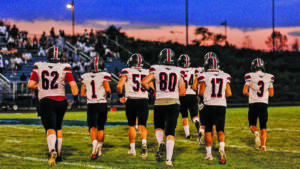 The final of this year’s Legg Mason Tennis Classic in Washington, D.C., Sunday was one of the more entertaining in years. Andy Roddick was pitted against an upstart newby who was on the verge of “tournament darling” status, and seemed on a mission to “school” the boy and impose on him his hard-earned rock star status.
The final of this year’s Legg Mason Tennis Classic in Washington, D.C., Sunday was one of the more entertaining in years. Andy Roddick was pitted against an upstart newby who was on the verge of “tournament darling” status, and seemed on a mission to “school” the boy and impose on him his hard-earned rock star status.
By now a seasoned veteran at only 24, Roddick started playing the Washington tournament at age 18 in 2000. This Sunday marked his third title here. As a tune up for the U.S. Open, it was a step forward toward regaining the stature that saw him ranked first in the world in 2003. But it was also more, something akin an older buck pitted against a young challenger for the hearts of the fans.
To win it all Sunday, Roddick had to derail the story of the week, a fresh-faced, 6 ft. 9 in. recent college graduate, John Isner of the University of Georgia Bulldogs. Only months ago, Isner, 22, led his team to the NCAA title in his fourth year of college competition.
Until last week, Isner played only one match since entering the heady professional ranks two months ago. But he stunned everyone last week when he ripped off wins over the likes of Tim Henman and Tommy Haas, winning five matches overall since starting as a wild-card to find himself up against one of the biggest names in the sport on Sunday.
 After Sunday’s win, Roddick said he welcomed Isner as another force for American tennis. But he wasn’t quite so gracious a couple days earlier, when a lot of attention was being paid to the rookie.
After Sunday’s win, Roddick said he welcomed Isner as another force for American tennis. But he wasn’t quite so gracious a couple days earlier, when a lot of attention was being paid to the rookie.
Friday night, in his press conference following his match, Roddick was asked what he thought about Isner’s Cinderella-like emergence. “Well, no one is exactly sad to see another American doing well,” he said.
“But what if Isner became the darling of the tournament, and people rooted for him over you if you met,” Roddick was asked.
“It is true that he is the ‘feel good’ story of the tournament so far,” Roddick replied. “But I would not like to think that I’ve spent eight years building up my fan base only to have it suddenly evaporate.”
In other words, there was plenty of reason for Roddick to want to put this youngun’ in his place if he got the chance.
That’s why Roddick seemed particularly earnest when the two did, indeed, wind up facing off Sunday.
Early in the match, when things didn’t go well for Roddick, although he never lost a service game in his 6-4, 7-6 victory, he was intense, blurting out loud expletives more than once.
The study of contrasts was interesting from that standpoint. While Roddick’s audible expressions of frustration were more, shall we say, “traditional,” Isner’s had a quaint college-like ring. Instead of four-letter words, on a couple of occasions, Isner could be heard blurting out a Homer Simpson-esque “Doh!”
Isner was up 3-2 in the first set and in striking range of breaking Roddick’s serve when Roddick abruptly rattled off 10 straight points to turn the tables, break Isner’s serve and then sail to the first set victory.
In the second set, neither broke the serve of the other, setting up a tie-breaker that Roddick won, 7-4, for the tournament.
Without a doubt, it mattered to Roddick that the 8,000 or so fans who packed the William H. G. FitzGerald Tennis Center in Rock Creek Park, did not dessert him in favor of Isner. Both got a lot of cheers throughout.
But Isner gained some fan points when, midway through the second set, he drove a super-easy desperation lob from Roddick right into the net. Isner lowered his large frame into a crouch, looked down, but came up laughing.
The crowd appreciated the attitude, and cheered hard when he bounced back to win the game and stay competitive in the match to the end.
“He kept his composure,” Roddick said in complimentary remarks about Isner after the match. “I will be intrigued to see how he’ll do from here on.”
What will Isner need to do to improve? “Just keep playing at this level. He’ll learn what he has to do,” Roddick said, adding, “But I think I found some things about his game that were useful for me. Of course, I can’t divulge what those are without putting myself at a disadvantage.”












